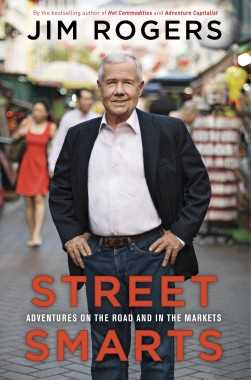

Recently, Emerj had a chance to catch up with Jim Rogers, the famed author, investor, and co-founder of the Quantum Fund with legendary investor George Soros. He is now chairman of Rogers Holdings and Beeland Interests, Inc, and is the creator of the Rogers International Commodities Index. As an best-selling author, Rogers has penned Investment Biker: Around the World with Jim Rogesr (1995), Adventure Capitalist: The Ultimate Road Trip (2003), and many other works.
We were fortunate to speak with Rogers on his thoughts on the pace and impact of technological progress today.
TE: Having lived through many different historical events, seen the birth of widespread computing, the internet, do you feel that technology is growing at a faster rate – that it is growing at an exponential or even logarithmic scale, as opposed to a linear scale?
JR: Well the difference in 1900 and 1915 – certainly not liner, its geometric if not a rocket ship. As far as technology – when the radio came, when electricity came, when the steam engine came, these things made staggering changes in the world. I think there are studies that say yes, technological change in these years is faster than others. I don’t know how you measure that. I know that the UK went from essentially nothing in 1820 to in 1835 they had 2/3rd of all the machines in the world. Whereas in the 1820’s no one thought much about the UK except they had defeated Napoleon. But that didn’t lead to riches or gigantic industrial revolution happening in the UK instead of in Germany or japan or even America. Yes, it is an easy facile type of statement, and we are experiencing staggering changes, as I’ve said – my kids will never go to a post office, which would be inconceivable over the past couple hundreds of years or bank which would have been inconceivable over the past several thousands of years. However, fortunately or unfortunately, the world has always seen dramatic changes.
TE: Are you optimistic this will have a positive change or do you see it could also have a negative change.
JR: Both, we’ll have staggering wars, technology will kill a lot more people, destroy a lot more capital, will destroy countries and societies. At the same time it will cause birth and rebirth to plenty others. Was the atom bomb good or bad – certainly if you were Japanese you didn’t think it was very good. But on the other hand if you were TVA (Tennessee Valley Authority) you thought it was spectacular. Its both. The machine gun. Noble. When Nobel invented dynamite, he said “this will bring peace to the world” because no one will want to kill each other; the consequences will be horrible. He was wrong, they figured out ways how to kill even more people. So, its some of both.
We’d like to extend a thanks to Jim Rogers for taking the time to interview with us here. Learn more about his travels, investing, and books at his main website: http://www.jimrogers.com.
-Daniel Faggella







